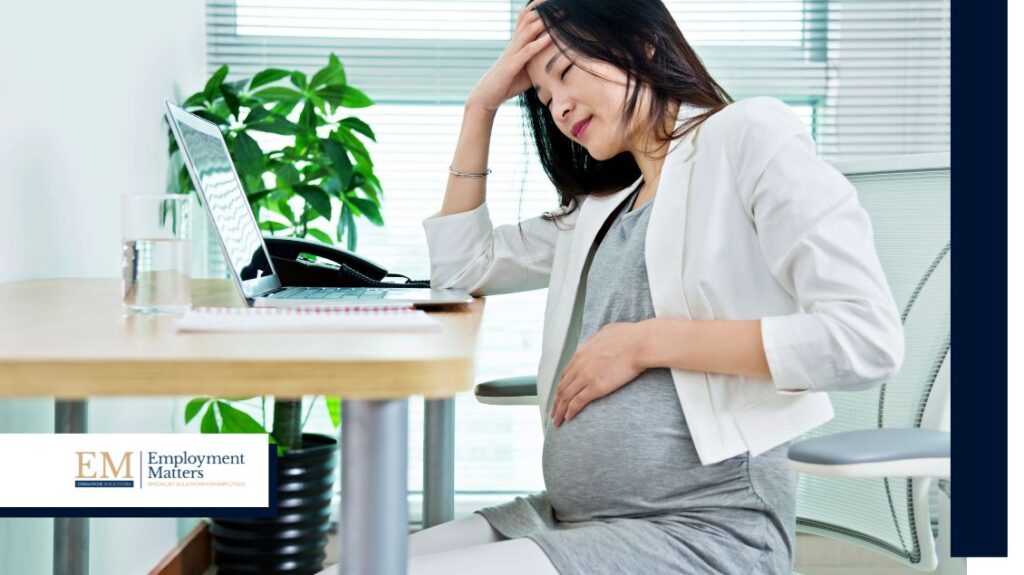Maternity discrimination is a serious issue that affects women all over the world, including in Ireland. It is women’s unfair workplace treatment due to pregnancy, childbirth, or maternity leave. In Ireland, it is against the law to discriminate against pregnant employees, giving birth or on maternity leave. However, despite the legal protections, many women still experience discrimination during this time.
If you are pregnant or have recently given birth, it is important to understand your rights and what you can do if you face discrimination in the workplace. This article explains the issue of maternal discrimination in Ireland, what it looks like and what you can do to protect yourself.
What is Maternity Discrimination?
Maternity discrimination is any unfair treatment a woman experiences in the workplace due to pregnancy, childbirth, or maternity leave. This can include being denied a promotion, given fewer hours, or even fired. Maternity discrimination can also involve harassment, such as comments about a woman’s pregnancy or childbirth.
In Ireland, the Employment Equality Acts 1998-2015 prohibits discrimination based on gender, including pregnancy and maternity. It is illegal for employers to mistreat employees due to pregnancy, childbirth, or maternity leave.
What Does Maternity Discrimination Look Like in Ireland?
Maternity discrimination can take many forms, and it’s not always obvious. Some examples of maternity discrimination in Ireland include:
Unequal Treatment
Employers may treat pregnant women or those on maternity leave differently from other employees. This could include denying them opportunities for promotion or training or giving them fewer hours or less desirable work.
Harassment
Comments or behaviour related to a woman’s pregnancy or childbirth can be considered harassment. This could include making jokes about her pregnancy, making comments about her physical appearance, or questioning her ability to do her job.
Redundancy
Firing an employee for pregnancy, maternity leave, or maternity leave is illegal. However, some employers may use these reasons as an excuse to fire an employee.
Denial of Leave
Employers may refuse to grant an employee’s request for maternity or parental leave, which is also illegal.
Refusal to Accommodate
Employers must accommodate pregnant employees or those on maternity leave. This could include providing a more flexible work schedule or adjusting their work environment. It could be considered discrimination if an employer fails to accommodate an employee.
Maternity Discrimination in Ireland: What You Need to Know
If you are pregnant or have recently given birth, it is important to know your rights and what you can do if you experience discrimination based on childbirth at work.
What are your Rights?
According to the Equal Employment Law, employers must not discriminate against female employees on the grounds of pregnancy, childbirth or maternity leave. You are entitled to the same treatment and opportunities as other employees. They also have the right to take maternity leave and return to work after the leave.
What Should You Do if You Experience Maternity Discrimination?
If you believe that you have been a victim of maternity discrimination, you should take the following steps:
- Keep a record of any incidents of discrimination, including the date, time, and what happened.
- Speak to your employer or human resources representative about the issue. They may not be aware that they are mistreating you, and they may be able to rectify the situation.
- If talking to your employer does not resolve the issue, you can file a complaint with the Workplace Relations Commission.
- Seek legal advice from a solicitor who specialises in employment law. They can advise you on your rights and the best action to take.
What Can Employers Do to Prevent Maternity Discrimination?
Employers can take steps to prevent maternity discrimination in the workplace, including:
- Providing training for managers and employees on maternity discrimination and the legal protections in place.
- Develop policies and procedures that address maternal discrimination and ensure that employees are treated fairly.
- Accommodation for pregnant or maternity leave workers. B. Through flexible working arrangements or workload adjustments.
- Conducting regular reviews of their policies and procedures to ensure they are current and in line with legal requirements.
Frequently Asked Questions (FAQs)
Here are some commonly asked questions about maternity discrimination in Ireland:
Irish pregnant workers are entitled to the same treatment and opportunities as other workers. Employers must not discriminate against you because of your pregnancy, maternity leave or maternity leave.
No, firing an employee due to pregnancy, childbirth, or maternity leave in Ireland is illegal.
If you are discriminated against at work because of childbirth, document all incidents and discuss the matter with your employer or Human Resources representative. If the problem persists, you can file a complaint with the Work Relations Committee or seek legal advice.
Employers can prevent birth discrimination by training managers and employees, developing policies and procedures for accommodating pregnant workers, and regularly reviewing policies and procedures.
If your employer refuses to grant you maternity leave, you can complain to the Workplace Relations Commission or seek legal advice.
Employers involved in maternal discrimination in Ireland must pay workers’ compensation and may face fines and lawsuits.
Wrapping Up
Maternity discrimination is a serious issue that affects women in the workplace, including in Ireland. Understanding your rights and what you can do if you experience discrimination during pregnancy, childbirth, or maternity leave is essential. Employers also have a responsibility to prevent maternity discrimination in the workplace and should take steps to ensure that their policies and procedures are in line with legal requirements.
If you experience maternity discrimination, don’t hesitate to take action. Contact us if you need help with a maternity discrimination case. Keep a record of incidents, speak to your employer or human resources representative, and seek legal advice if necessary. Remember that you have the right to be treated fairly and enjoy the same opportunities as other employees.



